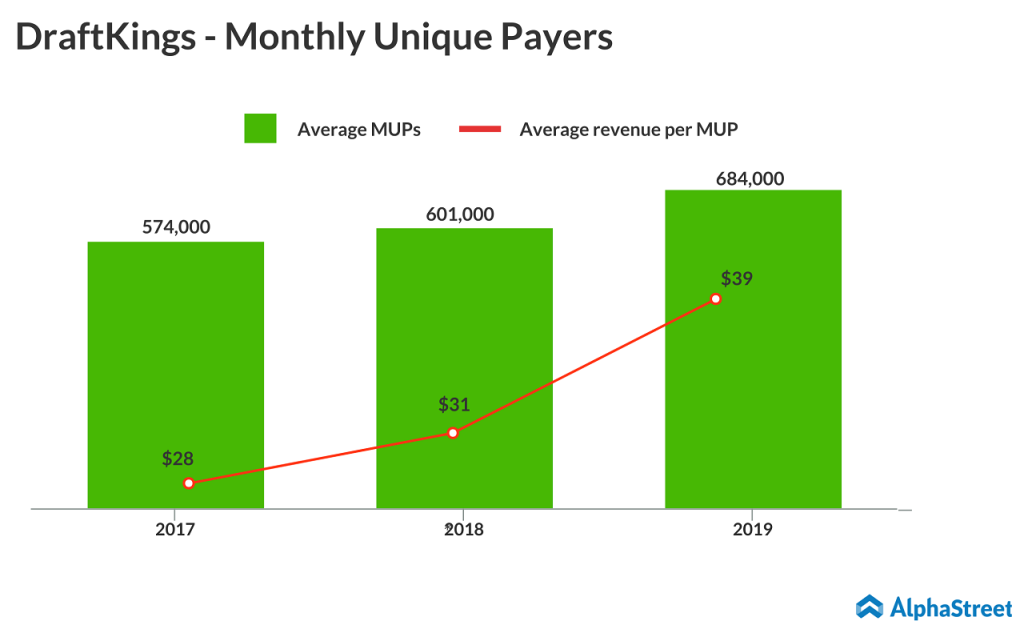Overview
Across all the product offerings, the digital sports entertainment company provides users with a single integrated platform that provides one account, one wallet, a centralized payment system and responsible gaming controls, compliant with regulations across all jurisdictions in which the company operates. These product offerings, which generate revenue for the company, are available through both web and mobile applications.

Growing user base
Monthly unique payers, (MUPs – the number of unique paid users on a monthly basis), has been growing year-over-year for DraftKings. For the first quarter ended March 31, 2020, MUPs grew to 720,000 from 600,000 in the prior year quarter. Average revenue per MUP increased to $41 from $37 in the first quarter of 2019.
In DFS platform, users pay an entry fee and select a team of players for a specific sporting event and they will compete against other users. The users are then ranked based on the number of fantasy points accrued by each user’s fantasy sports team. If a user finishes in a position that is within the prize payout table, the user wins the corresponding prize. DraftKings generates revenue from contest entry fees, net of amounts paid out as prizes and customer incentives.
Continuing loss
Since its inception, DraftKings has generated neither profit nor positive cash flow from operations. Net loss of $76 million in 2018 expanded to $143 million in 2019. However, revenue grew 43% annually to $323 million in 2019.
Opportunities
During the Q1 2020 call, CEO Jason Rabins stated that the rapidly growing digital sports entertainment and gaming industry opportunity represents an addressable market of over $30 billion in the US alone when considering a combination of online sports betting, fantasy sports, and iGames.
As of May 6, 2020, 21 states and the District of Columbia, have legalized sports betting in some form. As more states legalize the sports betting, more players will be attracted, which in turn will increase revenue for DraftKings. The company has been working with regulators to get its products live in states where it does not currently operate.
Despite missing several revenue opportunities from Q1 sporting events, DraftKings grew its revenue by 30% in the first quarter of 2020. However, there was an acceleration in iGaming activity after major sporting events stopped, and people began looking for alternative forms of entertainment.
Growing user base, unaddressed online gaming market in the US, and the increased momentum in the legalization of sports betting in more states are the bright spots for DraftKings.
Roadblocks
COVID-19 has created headwinds canceling several sporting events in the US and around the world. The company missed several weeks of the NBA and NHL seasons in Q1. Even yesterday, when a new coronavirus outbreak led to postponing the two games of Major League Baseball (MLB), DKNG stock tumbled more than 6%.
DraftKings also faces competition from existing black-market gambling outlets and its main rival FanDuel, which was acquired by Irish company Flutter Entertainment (formerly known as Paddy Power Betfair) in 2018.
It’s worth noting FanDuel and DraftKings called off their planned merger in 2017 as the Federal Trade Commission blocked it saying the merged company would become a monopoly and control more than 90% of the US market for paid daily fantasy sports contests.
Safe bet?
Till things get back to normal, it would be tough for DraftKings to bring in more users to their platforms. Let’s hope that later this year or in early 2021, the world will return to normalcy and all the sporting events will be played with great enthusiasm, like a few months ago. Till then DraftKings stock might experience a sideways movement as it has already had a bullish run. Investors can wait until the end of 2020 and then take a decision on DraftKings stock.
DISCLAIMER: The article does not necessarily imply the views of AlphaStreet, and contains opinions of the author alone.
